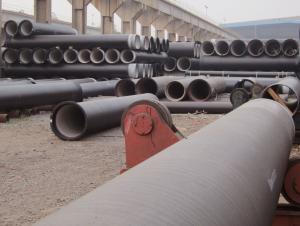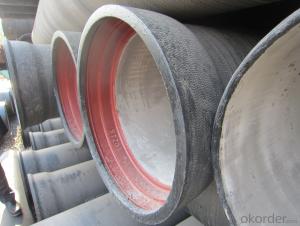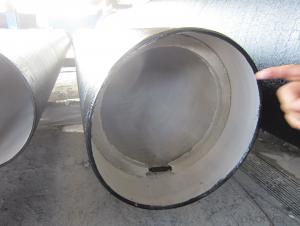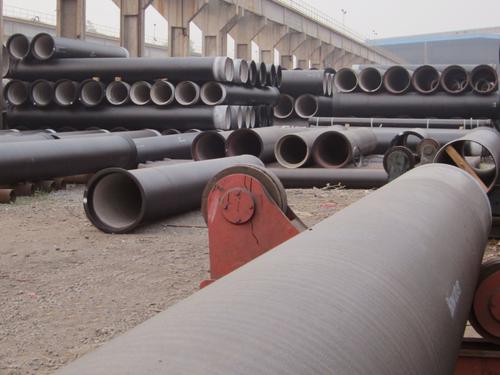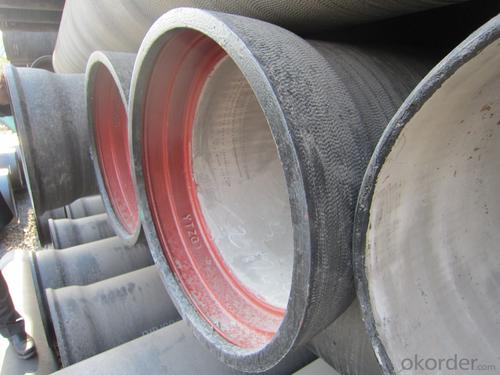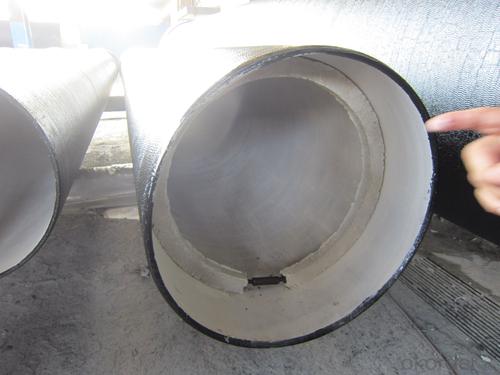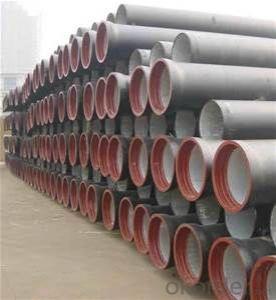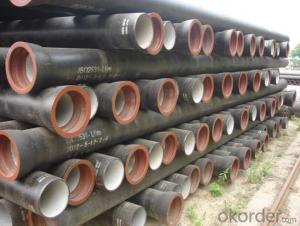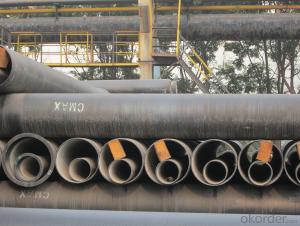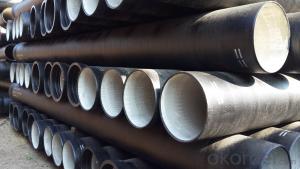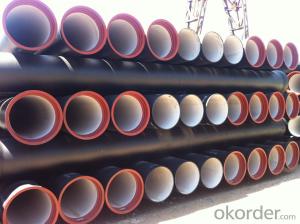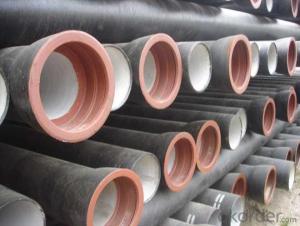Ductile Iron Pipe of China DN300 EN545/EN598/ISO2531 High Quality DI Pipe
- Loading Port:
- China main port
- Payment Terms:
- TT or LC
- Min Order Qty:
- 25 m.t.
- Supply Capability:
- 200000 m.t./month
OKorder Service Pledge
OKorder Financial Service
You Might Also Like
1. Ductile Iron Pipe Description :
2) Pipe ends: Spigot and socket ends, with 100% SBR rubber gaskets accoding to ISO4633
3) we can do third party inspection according to customer's request.
4) Our products have been sold to many international market, such as Middle East and South East Asia and Africa.
2. Main Features of the Ductile Iron Pipe:
• Chemical checking
• NDE after rough machining
• Mechanical testing after heat treatment
• Final NDE,dimension inspected
2).Quality document
• Full Q.A document as per client request
3).Packing and Shipping
• standard export package(carton/wooden case/pallet)
• accept FOB,FAS,CNF,CIF door to door etc or customer designated shipping agent
4).Service
• Drawing: we can translate your original drawing, offer best suggestion on design
• Quality: we have full set quality control system to guarantee the best quality.
• Inspection: inspect in house, all our products must be checked 3 times before packing.
3. Ductile Iron Pipe Images:
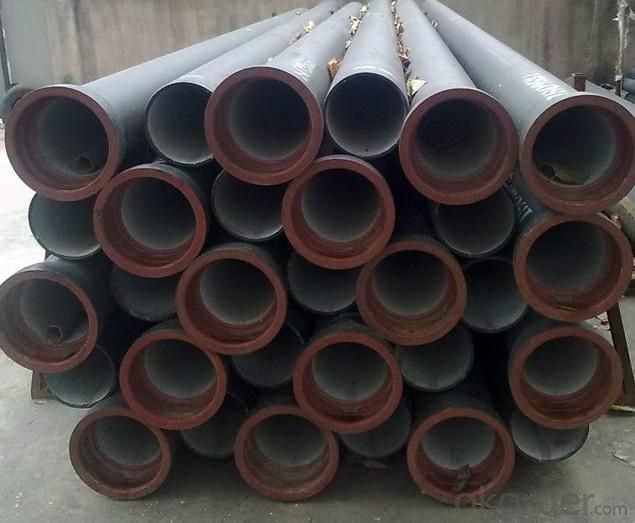
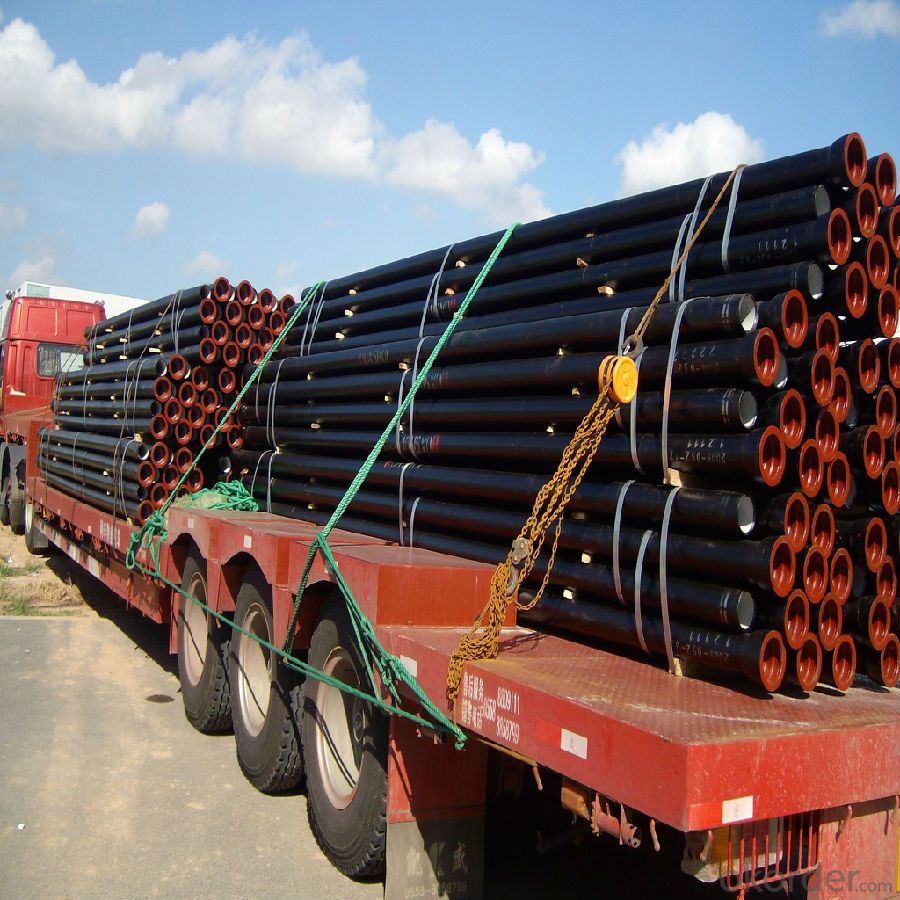
4. Ductile Iron Pipe Specification
Grade: A53 Grades A/B, ASTM A106 Grades B/C,ASTM A179,AWWA, C200, ASTM A139, ASTM A120, API 5L Grade B,X42, X52, X56, X60, X65, X70, X80, X100
Weld Alternatives: LSAW
OD size range: 6.4~44.5mm
Wall thickness: 406.4~1422mm
Length: 3 - 12 m according to requirment
Note: Other grade can also be provided after consulting. Special design are available for coal slurry conveyance LSAW line tube
5. FAQ:
1.Q: Why would you choose ductile iron pipe rather than other pipe materials?
A:The reasons are obvious for that not only ductile iron pipe possesses the inherent strength and flexibility of ductile iron, combined with proven corrosion protection systems, but also the cost savings can be achieved from design to installation and commissioning.
2.Q:Why can you guarantee the inner of pipes can’t be corroded?
A: High alumina cement mortar lining and sulphate-resistant cement mortar lining. These two special linings are applicable to inner anti-corrosion for sewage pipes, improving resistance to erosion of the sewage components.
- Q: How do ductile iron pipes perform in sandy soil conditions?
- Ductile iron pipes perform well in sandy soil conditions due to their inherent strength and durability. The material's high tensile strength allows it to withstand the pressure exerted by the surrounding soil, preventing pipe deformation and breakage. Additionally, the corrosion resistance of ductile iron ensures a longer lifespan, even in corrosive sandy soil environments.
- Q: How do ductile iron pipes handle ground settlement?
- Ductile iron pipes are highly effective in handling ground settlement due to their inherent flexibility and resistance to deformation. The unique properties of ductile iron, including its high tensile strength and elongation capacity, make it an ideal material for withstanding ground movement. When ground settlement occurs, which is the downward movement of soil or sediment, ductile iron pipes have the ability to flex and adjust to the shifting ground without fracturing. The pipes can absorb the stress caused by the settlement and distribute it evenly along their length, minimizing the risk of cracks or breaks. Furthermore, ductile iron pipes are designed with a bell and spigot joint system, which allows for slight movement and rotation at the joints. This feature enables the pipes to accommodate ground settlement by absorbing any misalignment or shifting of the surrounding soil. Additionally, ductile iron pipes have a higher load-bearing capacity than other materials like PVC or HDPE. This means that they can withstand heavier loads and pressures from the surrounding soil, reducing the risk of pipe failure or collapse during ground settlement. In conclusion, ductile iron pipes are well-suited to handle ground settlement due to their flexibility, resistance to deformation, and ability to distribute stress evenly. Their unique properties ensure that they can withstand the challenges posed by shifting ground conditions, making them a reliable choice for underground infrastructure projects.
- Q: What are ductile iron pipes?
- Ductile iron pipes are a type of iron pipe that possess high tensile strength and flexibility. They are made by treating cast iron with trace amounts of magnesium to create a material that is stronger and more resilient than traditional cast iron pipes. The addition of magnesium changes the microstructure of the iron, resulting in a matrix of graphite nodules within the iron, hence the name "ductile iron". This unique structure gives ductile iron pipes their remarkable properties, making them highly resistant to cracking and breaking even under high pressure and extreme temperature conditions. Ductile iron pipes are commonly used in water and wastewater systems, as well as in various industrial applications, due to their durability, longevity, and ability to withstand external loadings. They are also known for their ease of installation and low maintenance requirements, making them a popular choice in the construction industry.
- Q: Can ductile iron pipe be used for potable water systems?
- Yes, ductile iron pipe can be used for potable water systems. Ductile iron is a type of cast iron that is known for its strength, durability, and ability to withstand high pressure. It is also corrosion-resistant, making it suitable for use in water distribution systems. Ductile iron pipe is commonly used in potable water systems due to its longevity and low maintenance requirements. Additionally, it is approved by various standards organizations, such as the American Water Works Association (AWWA), for use in potable water applications. However, it is important to ensure that the ductile iron pipe used for potable water systems is manufactured and installed according to the appropriate standards and regulations to ensure the safety and quality of the water supply.
- Q: What are the typical joint restraint requirements for ductile iron pipes?
- Ductile iron pipes typically require joint restraints to prevent separation or pulling apart. Two common types of restraints are mechanical joint restraints and push-on joint restraints. Mechanical joint restraints are used when the pipe faces high internal pressures or external loads. They consist of a gland and a follower gland that are tightened around the joint with bolts or clamps. This secures the joint and prevents movement. On the other hand, push-on joint restraints are used when the pipe doesn't face high pressures or loads. They provide a seal and prevent separation due to ground movement or external forces. Push-on joint restraints are installed by pushing the pipe into the joint and securing it with a ring or collar. In addition to joint restraints, proper bedding and backfill materials are important for ductile iron pipes. These materials help distribute loads and provide stability, further enhancing the pipe's resistance to joint separation. It's important to note that the specific joint restraint requirements may vary depending on project specifications, pipe size, and operating conditions. Therefore, consulting the manufacturer's recommendations and engineering standards is essential for selecting and installing the proper restraints.
- Q: Does the cast iron pipe need separate corrosion protection?
- Ductile iron is characterized by its ease of decay and deformation, so if it is not a particular requirement, there is no need to do it alone
- Q: What is the expected thrust restraint method for ductile iron pipes?
- The expected thrust restraint method for ductile iron pipes is typically achieved through the use of mechanical joint restraints. These restraints are designed to resist the axial forces or thrust generated by the fluid pressure inside the pipe. The most common types of mechanical joint restraints used for ductile iron pipes include thrust blocks, tie rods, and harness restraints. Thrust blocks are concrete structures placed around the pipe joints to resist the thrust forces. They are typically constructed at bends, tees, and other changes in direction to prevent the movement of the pipes. Tie rods are another common method of thrust restraint, where steel rods are anchored to the pipe and secured to an immovable structure to counteract the thrust forces. Harness restraints consist of a series of steel rods or cables that encircle the pipe and are anchored to the ground on either side. These restraints distribute the axial forces along the length of the pipe, preventing movement and ensuring stability. The specific thrust restraint method used for ductile iron pipes may vary depending on factors such as pipe diameter, fluid pressure, soil conditions, and local regulations. It is important to consult with industry standards, engineering guidelines, and local authorities to determine the appropriate thrust restraint method for a given application.
- Q: Are ductile iron pipes resistant to biological growth?
- Yes, ductile iron pipes are generally resistant to biological growth. The smooth interior surface of ductile iron pipes prevents the buildup of biofilm and inhibits the growth of bacteria and other organisms. Additionally, the material itself is not conducive to the growth of biological contaminants, making ductile iron pipes a reliable choice for water and wastewater applications.
- Q: What is the expected abrasion resistance of ductile iron pipes?
- The expected abrasion resistance of ductile iron pipes is generally high, as they are known for their durability and ability to withstand wear and tear caused by abrasion over an extended period of time.
- Q: What is the expected leakage rate of ductile iron pipes?
- The leakage rate of ductile iron pipes can vary depending on several factors, including pipe age, condition, installation quality, and external influences on pipe integrity. However, in comparison to other pipe types, ductile iron pipes are renowned for their durability and low leakage rates. Based on industry standards and studies, well-maintained and correctly installed ductile iron pipes typically have an expected leakage rate of less than 0.5 liters per pipe per day (LPPD). This leakage rate meets the requirements set by regulatory bodies and organizations, and is considered acceptable. It is crucial to emphasize that regular maintenance and inspections are vital in sustaining the low leakage rate of ductile iron pipes. Prompt identification and repair of potential leaks or damages can effectively minimize the overall leakage rate. Moreover, advancements in manufacturing techniques and pipe design have led to the creation of more leak-resistant ductile iron pipes. These pipes may have even lower expected leakage rates than the industry average, further improving their performance and reliability. Ultimately, when properly installed and maintained, ductile iron pipes are a reliable choice for various water distribution and transmission systems, as their expected leakage rate is generally low.
Send your message to us
Ductile Iron Pipe of China DN300 EN545/EN598/ISO2531 High Quality DI Pipe
- Loading Port:
- China main port
- Payment Terms:
- TT or LC
- Min Order Qty:
- 25 m.t.
- Supply Capability:
- 200000 m.t./month
OKorder Service Pledge
OKorder Financial Service
Similar products
Hot products
Hot Searches
Related keywords
